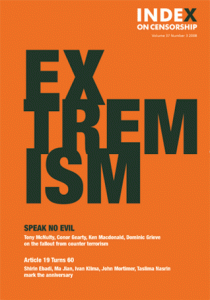28 Nov 2008 | Iran
Bahman Totonchi, a journalist for the former Kurdish weekly Karfto, was arrested on 18 November following a house search by intelligence agents. The authorities had been harassing the journalist since the closure of Karfto on 29 December last year, when the weekly’s licence was withdrawn for good on the grounds of “failure to publish regularly”. It is not known where Totonchi is now being held.
(more…)
10 Nov 2008 | Middle East and North Africa, News and features
Shahvrand-e Emrouz (‘Today’s Citizen’), an Iranian reformist magazine, has been temporarily closed by the country’s press watchdog after the unauthorised publication of political content.
(more…)
5 Sep 2008 | Middle East and North Africa, Volume 37.03 Autumn 2008
 This week, four feminist bloggers were sentenced to imprisonment in Iran. In an exclusive preview of the new issue of Index on Censorhip (out next week), Iranian Nobel laureate Shirin Ebadi discusses the prospects for free expression in her country.
This week, four feminist bloggers were sentenced to imprisonment in Iran. In an exclusive preview of the new issue of Index on Censorhip (out next week), Iranian Nobel laureate Shirin Ebadi discusses the prospects for free expression in her country.
Read Shirin Ebadi’s ‘View From Iran’ here (pdf)
4 Sep 2008 | Middle East and North Africa, News and features
A Tehran court has passed six-month prison sentences on four female bloggers, found guilty under article 500 of the Islamic criminal code. The four women were charged for articles that appeared in two online newspapers that defend women’s rights in Iran, Zanestan and Tagir Bary Barbary.
Read more here

